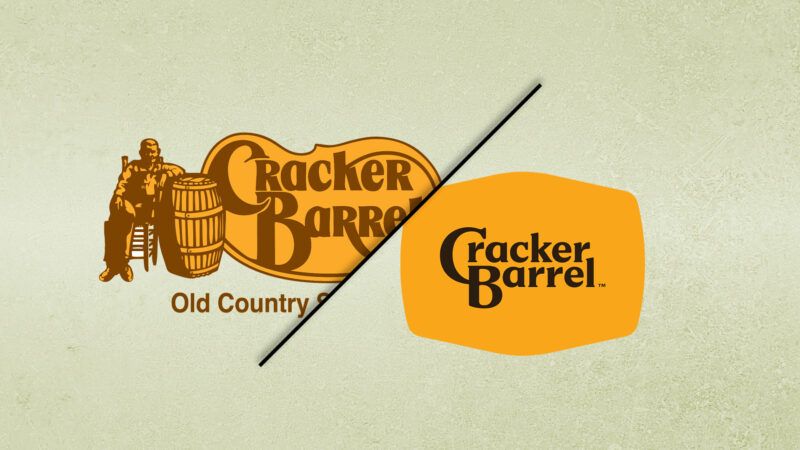Cracker Barrel Didn't 'Go Woke.' It Just Went Broke.
The company's value was plummeting long before it nixed the "Old Timer" from its logo.

Growing up in the South, Cracker Barrel felt a bit like a theme park attraction. Its down-home frills, Old Country Store merch, and cartoonishly indulgent comfort food embody a storybook spectacle of Southern life that doesn't really exist anymore in popular culture. Which helps explain why the company's decision to neuter its logo—axing the overalls-clad "Old Timer" leaning against the eponymous barrel—did not garner glowing reviews from some of the more vocal participants in the discourse.
The criticism, from a slew of politicians and public figures, coalesced around a core theme: that the restaurant had fallen prey to the wokeness bug and would soon become another one of its casualties. Go woke, go broke, as the saying goes.
There are a few reasons why that critique misses the mark. For one, it isn't obvious how Cracker Barrel blandifying its logo is an apt example of wokeness, which is typically understood to mean an obsessive fixation with social justice and grievance mining. There's an irony here: Central to the opposition to woke ideology is the notion that progressives tend to brand every societal ill as the product of an ism or a phobia: racism, classism, sexism, homophobia, transphobia, and on. But just as not everything progressives dislike is "racist," not everything that irks conservatives is "woke." Words have meaning.
More importantly, though, the outrage misunderstands the order of operations here. Cracker Barrel's logo change did not come out of left field, despite that some just noticed. It's part of a sustained makeover effort to lift the company out of a fairly dire financial slump. That doesn't mean the strategy will work—that the logo alteration sent the stock tumbling may very well be an indicator it won't (although the jury is still out on its long-term effects). But Cracker Barrel didn't need to "go woke" to go broke. Because it was, colloquially speaking, already broke.
The company's troubles—with or without the Old Timer—are reflected in its valuation. In April 2021, Cracker Barrel stock was selling for $175.09 a share, according to its market trajectory on TradingView. Earlier this month, prior to any logo drama, it was selling for $57.27—a plunge of more than two-thirds, which, by any standard, is pretty grim. That didn't happen overnight, nor is it even Cracker Barrel's nadir. The company has steadily sagged over the last several years, its value dipping as low as $37.33 per share last September.
The chain is not alone. In February, Denny's announced that it would close up to 178 locations by the end of 2025. Not long before, TGI Fridays and Red Lobster filed for bankruptcy. All of these restaurants can be classified under the same general umbrella as Cracker Barrel, with the exception that people cannot fault a misplaced controversy over wokeness for their failures. The biscuits could not even save Red Lobster. The business landscape is changing. It's rough out there.
Cracker Barrel, for its part, appears to be aware of this, and has been trying to adapt for a while. The logo is just the latest change. It has also updated its decor, for example, to give off a more modern vibe, and made changes to its menu. The effort, it seems, is tailored in part to attracting a younger demographic, who have never exactly been Cracker Barrel's target market. (In one of its more seismic shifts, the company also began selling alcohol about five years ago.)
The changes, at least at the moment, look to be fairly fruitless. Older customers—Cracker Barrel's bread and butter—have been slow to return en masse post-pandemic. And the business likely always faced an uphill battle in trying to rebrand for a new audience, because the company's appeal is so squarely married to its specific old-time charm. There is something to blame here, but it's not wokeness. It's the market, and its effects are understandably disappointing for those nostalgic for childhood Cracker Barrel visits (relatable) where it may have felt like stepping into a little Southern wonderland. Which makes you wonder: Have they been back recently?


Show Comments (160)